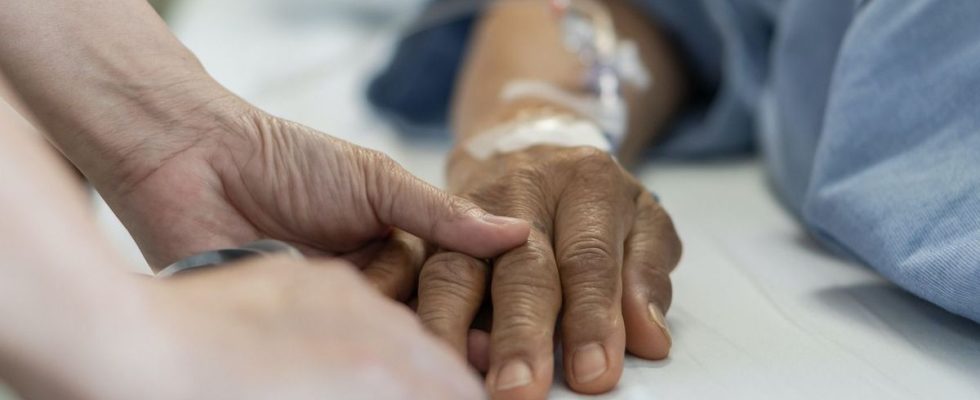Published on
Updated
Reading 3 min.
In a press release dated December 14, 18 gerontology and palliative care companies, unions or associations protested against the path that the issue of end of life seems to be taking in France. The details emerging from a new report seem particularly dangerous to them.
“This December 13, we discovered with dismay the text presented to the President of the Republic, a few weeks ago, relating to the support of the sick and the end of life. The poor content of this document arouses concern and the anger of health professionals. This December 14, 18 associations and unions of health professionals, nurses, gerontologists, palliative care doctors, united their voices to denounce the latest report submitted to the government on “a new strategy for caring for patients at the end of life”. These caregivers first fear a drift from this “end of life assistance” towards too complacent assistance in dying and which they refuse.
What does this latest report say?
It is an article from Figaro who ignited the powder on December 8, by revealing the report that the professor of public health and oncologist Franck Chauvin submitted to Agnès Firmin Le Bodo, Minister Delegate in charge of Territorial Organization and Health Professions. This guarantees appropriate care within ten years for anyone at the end of their life and those around them, as Emmanuel Macron wishes. The report therefore recommends renaming palliative care to transform it into “supportive care” thus including everything relating to the end of life, whether care with a curative aim or not.
The plan is based around fifteen measures, including the creation of mobile support care teams, made up of a doctor, a nurse and a psychologist, the creation of support homes, or even a university sector to develop palliative culture. The text also presents, without naming it, suicide assisted by a third party. In other words, the patient would administer the lethal substance himself, but a caregiver or even a relative could help him if he is unable to do so.
“First aid in reverse” and abuses are feared
For the signatory professionals, this is too much, and this provisional version of the bill “relating to the support of the sick and the end of life” poses a problem in several respects.
“In this text, euthanasia and assisted suicide directly integrate the continuum of care, (…) going against our commitment which teaches us that giving death is not treatment. The drafters go so far as to assert that it is appropriate to put in place ‘reverse first aid’, a term which alone depicts the extent to which the drafters of these measures are ‘above ground’. they lament.
The simple fact of now replacing the term palliative care (pain management and supportive oncological care) with “supportive care” also takes on a worrying dimension, according to them: “Is this the way to include euthanasia and assisted suicide in the range of care?”
They therefore believe that the protection of people at the end of life is in danger. By opening the project to the possibility of resorting to euthanasia carried out by a third party (who can be a “relative”), this new strategy could, according to them, induce certain excesses or pressure on the sick person. “What will happen to vulnerable people, particularly the elderly, who already so often fear being a burden on those around them? ask the signatories.
Finally, nurses would be very strongly involved in the procedure,”contrary to a desire expressed, on several occasions, to see the meaning of their mission respected.
The end of life law pushed back to 2025
For professionals, this provisional report would therefore be on the wrong track. “The urgency is to focus on the development of palliative care, pain management and supportive oncological care.” they repeat. A point of view that is not shared by everyone, as the debate divides.
Regardless, conclusions will still have to wait. The law on end of life and assisted suicide will not be effective before 2025. The text should only be presented in February 2024 after a final arbitration by the President of the Republic and, according to the Minister Delegate Agnès Firmin -The Bodo, “it will require at least 18 months of debate in Parliament”.
🔴 Active assistance in dying effective in France in 2024? ➡️ “The answer is no”, affirms the minister in charge of the file, Agnès Firmin Le Bodo. “The bill will be presented in February. It will take at least 18 months of debate” in Parliament. #8h30franceinfo pic.twitter.com/XmPRX0492C
— franceinfo (@franceinfo) December 13, 2023
An unbearable delay for the Association for the Right to Die with Dignity (ADMD) which declares: “At best, France will not have a law before 2026! Knowing that in the countries of the world which have legalized active assistance in dying nearly 3% of deaths are linked to this end-of-life care, these are, in France (600,000 deaths annually) some 36,000 of our loved ones, of our friends, who will die in conditions they did not want, probably after unbearable agony“.
